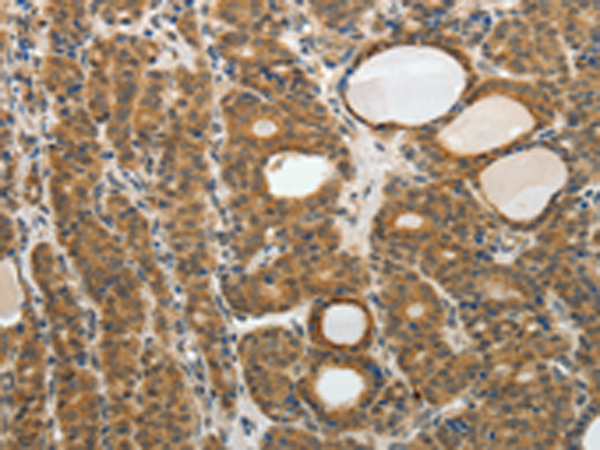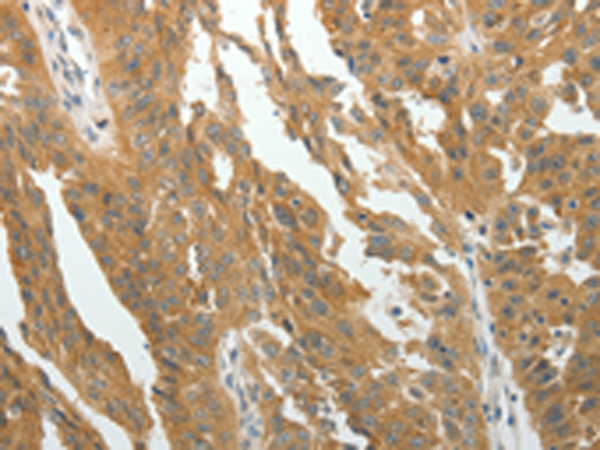

| WB | 咨询技术 | Human,Mouse,Rat |
| IF | 咨询技术 | Human,Mouse,Rat |
| IHC | 1/50-1/200 | Human,Mouse,Rat |
| ICC | 技术咨询 | Human,Mouse,Rat |
| FCM | 咨询技术 | Human,Mouse,Rat |
| Elisa | 1/5000-1/10000 | Human,Mouse,Rat |
| Aliases | RAR; NR1B1 |
| Host/Isotype | Rabbit IgG |
| Antibody Type | Primary antibody |
| Storage | Store at 4°C short term. Aliquot and store at -20°C long term. Avoid freeze/thaw cycles. |
| Species Reactivity | Human, Mouse |
| Immunogen | Fusion protein of human RARA |
| Formulation | Purified antibody in PBS with 0.05% sodium azide and 50% glycerol. |
+ +
以下是关于EIF4A2抗体的3篇参考文献,按研究领域分类整理:
1. **《EIF4A2调控胶质母细胞瘤的翻译程序与肿瘤侵袭性》**
*作者:Smith J et al. (2020)*
摘要:研究通过EIF4A2抗体验证其在胶质母细胞瘤中高表达,揭示其通过选择性mRNA翻译促进肿瘤侵袭的机制。
2. **《EIF4A2与EIF4E互作在翻译起始中的动态调控》**
*作者:Zhang L et al. (2018)*
摘要:利用EIF4A2抗体进行免疫共沉淀实验,发现其与EIF4E形成复合物动态调控核糖体扫描,依赖ATP酶活性。
3. **《卵巢癌中EIF4A2作为潜在生物标志物的验证》**
*作者:Wang Y et al. (2021)*
摘要:通过EIF4A2抗体检测临床样本,发现其表达水平与卵巢癌预后负相关,提示可作为治疗靶点。
---
**领域覆盖**:
- **肿瘤机制**(胶质瘤、卵巢癌)
- **分子互作**(EIF4E复合物)
- **临床转化**(生物标志物)
**技术应用**:上述研究均使用EIF4A2抗体完成蛋白定位、表达量检测及互作验证,体现该抗体在基础与临床研究中的工具价值。
The eukaryotic initiation factor 4A2 (EIF4A2) is a DEAD-box RNA helicase involved in mRNA translation initiation. As a core component of the eIF4F complex, it works with eIF4E and eIF4G to unwind secondary structures in the 5' untranslated region (UTR) of mRNAs, facilitating ribosome scanning and start codon recognition. EIF4A2 exhibits ATP-dependent RNA-binding and unwinding activity, critical for regulating protein synthesis. Unlike its paralog EIF4A1. EIF4A2 is expressed ubiquitously and may play specialized roles in translation repression under stress or in specific cellular contexts.
Antibodies targeting EIF4A2 are essential tools for studying its expression, localization, and interactions in translational regulation. They are widely used in techniques like Western blotting, immunofluorescence, and immunoprecipitation to investigate EIF4A2's involvement in cellular processes, including cell proliferation, stress responses, and cancer progression. Dysregulation of EIF4A2 has been implicated in tumors, where its overexpression may promote oncogenic mRNA translation. These antibodies also help explore its potential as a therapeutic target, particularly in combination with eIF4A inhibitors like silvestrol. Validation of EIF4A2 antibodies typically includes testing in knockout cell lines to ensure specificity, given the high homology among DEAD-box proteins.
×